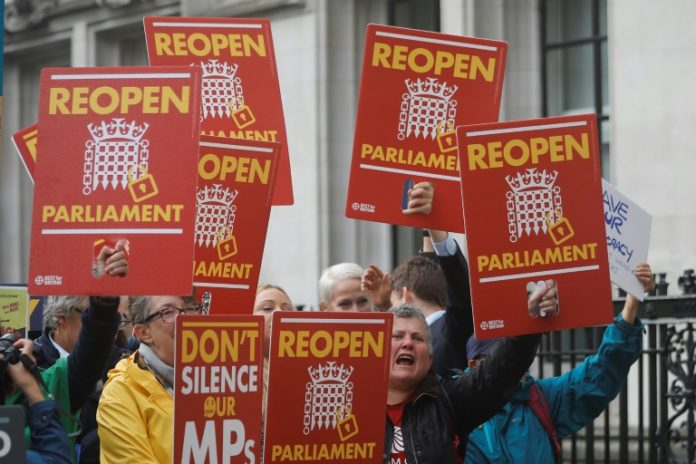Britain’s Supreme Court ruled Tuesday that Prime Minister Boris Johnson acted unlawfully in suspending parliament in the run-up to Brexit, in a stunning blow that sparked immediate calls for him to resign.
The 11 judges of the country’s highest court were unanimous in their verdict, which they said meant parliament could now immediately reconvene.
Johnson had argued that shutting down parliament until October 14 was a routine move to allow his new government to set out a new legislative programme.
But critics accused him of trying to silence MPs ahead of Britain’s scheduled exit from the European Union on October 31 – the terms of which remain unclear.

“The court is bound to conclude… that the decision to advise Her Majesty to prorogue was unlawful,” Supreme Court President Brenda Hale said.
She said this was “because it had the effect of frustrating or preventing the ability of parliament to carry out its constitutional functions”.
She said the suspension was as a result “void and of no effect”, adding: “Parliament has not been prorogued”.
The Speaker of the House of Commons, John Bercow, said MPs should reconvene immediately.
The judges “have vindicated the right and duty of parliament to meet at this crucial time to scrutinise the executive and hold ministers to account”, Bercow said.
The ruling is a major blow to Johnson, and sparked calls for him to stand down.
“I invite Boris Johnson, in the historic words, to consider his position, and become the shortest serving prime minister there has ever been,” main opposition Labour leader Jeremy Corbyn said.
The Westminster leader of the Scottish National Party (SNP), Ian Blackford, said: “We must be back in parliament immediately.

“We want to get back to work. On the back of this, Boris Johnson must resign.”
Johnson, who took office on July 24, had advised Queen Elizabeth II as head of state to prorogue parliament, which then took place early on September 10.
He insisted it was a long-overdue move unrelated to Brexit, but it sparked accusations that he was trying to avoid scrutiny from a hostile parliament.
Most members of the House of Commons oppose Johnson’s threat to leave the European Union next month even if he has not agreed exit terms with Brussels.
In two separate cases, more than 75 lawmakers and a team backed by former Conservative premier John Major had challenged the prorogation as unlawful.
One had failed in the High Court in England, while another succeeded in Scotland’s highest civil court – with the Supreme Court asked to make the final ruling.

Ahead of the decision, Johnson – who is attending the UN General Assembly in New York — repeated that MPs will still have “ample opportunity to debate Brexit”.
Officials noted that in the week between returning from their summer break and prorogation in the early hours of September 10, MPs rushed through a law aimed at stopping a “no deal” Brexit next month.
The government had argued that a prime minister’s power to suspend parliament was “one of high policy and politics, not law”.
Advocate General Richard Keen had argued that ruling against the government would see the courts straying into an “ill-defined minefield”.
The ruling is the most dramatic in the turbulent Brexit process, and comes at a crucial time.
Johnson has insisted Britain must leave the EU on October 31 no matter what, more than three years after the 2016 referendum vote for Brexit.
But the law passed by parliament earlier this month demands he ask EU leaders for a delay if he has not got a divorce deal by a Brussels summit on October 17.
He has expressed optimism that he can agree new terms by then, to replace the deal struck by his predecessor Theresa May, which was rejected by MPs.
But EU leaders are not as hopeful.
The bloc’s chief negotiator, Michel Barnier, said Monday that London’s current position did not offer any “basis to find an agreement” on leaving.
Johnson met EU Council President Donald Tusk in New York on Monday, after which the latter tweeted: “No breakthrough. No breakdown. No time to lose.”
The British prime minister also held talks in New York with the French and German leaders, while further meetings with European colleagues are planned on Tuesday.
However, there is speculation he may now have to return to face a crisis at home.
















